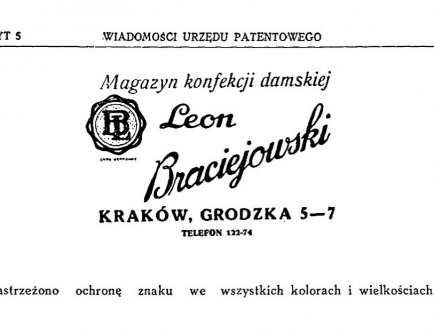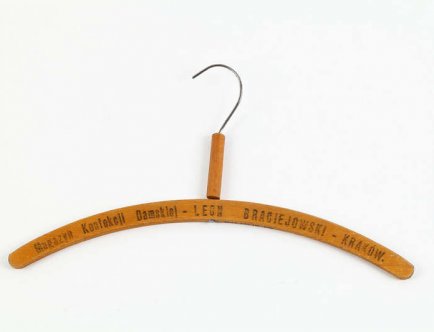From tailor to wealthy merchant and collector. Karkow career of Leon Braciejowski
The Museum of Krakow holds several wooden store hangers with the following inscriptions printed: “Leon Braciejowski, Grodzka 5-7, phone 122-74” and “Leon Braciejowski, Grodzka 5-7, Floriańska 28 Branch”, as well as “Women's Clothing Store – Leon Braciejowski – Krakow” and, on the reverse, “Grodzka 5-7, phone 122-74 – Krakow – Floriańska 28, phone 147-13”. One of them is presented at the permanent exhibition in the Schindler's Factory. The hangers with special prints belonged to the equipment of two exclusive stores located in prime locations in Krakow main streets.
The owner of these shops, Leon Braciejowski, was born in 1875. He came from a Jewish family and his original surname was Braciejowka. By changing it, he initiated a family line bearing this version of the surname. In 1906, he married Feigel (Frania) Reich. In 1907, their daughter Gizela (Tova) was born, one year later their son Józef, and in 1910, daughter Irena. At that time (already in 1907), Leon was listed in the Address Book of Krakow as a tailor with a workshop at 7 Grodzka Street.
In trade press in the 1920s, e.g. “Przegląd Kupiecki” from 1923, Leon Braciejowski self-advertised as the owner of the women's clothing store. He then announced “selling coats and suits at very low prices due to the restoration of the premises". Since 1924, besides the address of the store in Grodzka Street, the company's telephone number, then a four-digit number: 22-74, was listed in the Phone Books, Address Books, and advertisements. Braciejowski advertised the coats and suits from his shops in the program leaflets of the Słowacki Theater (e.g. in 1924) and in the press, also increasingly offering affordable post-season sales (“Nowy Dziennik”, 1928). In the Address Book from 1928, Leon Braciejowski was listed as a resident of tenement house no. 12 in Andrzej Potocki Street (now Westerplatte Street).
In 1931, in the “Announcements of the Patent Office”, Leon Braciejowski registered the mark of his company dealing with the purchase and sale of women's clothing. The mark presented the initials of LB in a round medallion – a rosette. In the same year, he published advertising leaflets illustrated with colored sketches of clothing designs available in his shops. He recommended the models of coats and costumes which he had chosen “after several weeks of work in Paris fashion houses”. He also assured that: “considering the hardship, I reduced the prices considerably, but without compromising the well-known quality of my goods”. Since then, the commercial activity of Braciejowski gained momentum. Since 1932, he was advertising not only his store at 5-7 Grodzka Street, but also its branch in 28 Floriańska Street. Both shops had their own telephone numbers, which were five-digit numbers at that time – like those on the hangers in the collection of the Museum of Krakow. Advertisements show that the Grodzka shop continued to sell coats and suits, while the company's branch in Floriańska Street in addition to that assortment, offered dresses, blouses and sweaters. An elegant blue evening dress with gold accents and the label of this shop is in the collection of the National Museum in Krakow. The press advertisements of the shops of Leon Braciejowski from the 1930s are among the most expensive ones, featuring a frame, a variety of typefaces and decorations. An advertisement from 1934 announces that the offer of the shop in Floriańska Street has been extended to include skirts, bathrobes, and pajamas.
In 1937, the former headquarters of the shop in Grodzka Street was mentioned as a branch of the shop at 28 Floriańska Street. Leon Braciejowski still lived in 12 Potockiego Street and apart from two company phones, he also had a home number. He was also active in community and charity work. In 1935, his name was on the list of founders of the new building of the National Museum, and in 1937, in the Address Book of the B'nai B'rith Jewish Humanitarian Associations of the Republic of Poland in Krakow. Braciejowski was also a collector of paintings; his collection included over seventy works. During the war, the collection was looted and scattered, and the shops were seized. In 1941, the occupation German-language newspaper “Warschauer Zeitung” advertised the shop in Floriańska Street as the largest women's clothing shop in Krakow (Krakaus grösstes Damenkonfektionsgeschäft) under the compulsory administration of the occupant, still with the surname of the former owner in its name. Advertisements of Leon Braciejowski's shop, indicating that the owner is Rudolf Masnik, were printed on German theater programs of the State Theater in the General Government in Krakow in 1943-1944. Braciejowski, his wife and son survived the war, and he passed away in 1954.
Years later, Nawojka Cieślińska-Lobkowicz, working on restitution of works of art, found a small watercolor painting by Erno Erb with an owner’s sticker stating that the item belonged to the collection of Leon Braciejowski. The painting was successfully returned to the grandchild of the Krakow merchant, who has lived in the United States. Until then, her only memento of the pre-war life of her grandfather was a hanger from the fashion stores in Krakow (the same as those from the collection of the Museum of Krakow).
Katarzyna Moskal
The owner of these shops, Leon Braciejowski, was born in 1875. He came from a Jewish family and his original surname was Braciejowka. By changing it, he initiated a family line bearing this version of the surname. In 1906, he married Feigel (Frania) Reich. In 1907, their daughter Gizela (Tova) was born, one year later their son Józef, and in 1910, daughter Irena. At that time (already in 1907), Leon was listed in the Address Book of Krakow as a tailor with a workshop at 7 Grodzka Street.
In trade press in the 1920s, e.g. “Przegląd Kupiecki” from 1923, Leon Braciejowski self-advertised as the owner of the women's clothing store. He then announced “selling coats and suits at very low prices due to the restoration of the premises". Since 1924, besides the address of the store in Grodzka Street, the company's telephone number, then a four-digit number: 22-74, was listed in the Phone Books, Address Books, and advertisements. Braciejowski advertised the coats and suits from his shops in the program leaflets of the Słowacki Theater (e.g. in 1924) and in the press, also increasingly offering affordable post-season sales (“Nowy Dziennik”, 1928). In the Address Book from 1928, Leon Braciejowski was listed as a resident of tenement house no. 12 in Andrzej Potocki Street (now Westerplatte Street).
In 1931, in the “Announcements of the Patent Office”, Leon Braciejowski registered the mark of his company dealing with the purchase and sale of women's clothing. The mark presented the initials of LB in a round medallion – a rosette. In the same year, he published advertising leaflets illustrated with colored sketches of clothing designs available in his shops. He recommended the models of coats and costumes which he had chosen “after several weeks of work in Paris fashion houses”. He also assured that: “considering the hardship, I reduced the prices considerably, but without compromising the well-known quality of my goods”. Since then, the commercial activity of Braciejowski gained momentum. Since 1932, he was advertising not only his store at 5-7 Grodzka Street, but also its branch in 28 Floriańska Street. Both shops had their own telephone numbers, which were five-digit numbers at that time – like those on the hangers in the collection of the Museum of Krakow. Advertisements show that the Grodzka shop continued to sell coats and suits, while the company's branch in Floriańska Street in addition to that assortment, offered dresses, blouses and sweaters. An elegant blue evening dress with gold accents and the label of this shop is in the collection of the National Museum in Krakow. The press advertisements of the shops of Leon Braciejowski from the 1930s are among the most expensive ones, featuring a frame, a variety of typefaces and decorations. An advertisement from 1934 announces that the offer of the shop in Floriańska Street has been extended to include skirts, bathrobes, and pajamas.
In 1937, the former headquarters of the shop in Grodzka Street was mentioned as a branch of the shop at 28 Floriańska Street. Leon Braciejowski still lived in 12 Potockiego Street and apart from two company phones, he also had a home number. He was also active in community and charity work. In 1935, his name was on the list of founders of the new building of the National Museum, and in 1937, in the Address Book of the B'nai B'rith Jewish Humanitarian Associations of the Republic of Poland in Krakow. Braciejowski was also a collector of paintings; his collection included over seventy works. During the war, the collection was looted and scattered, and the shops were seized. In 1941, the occupation German-language newspaper “Warschauer Zeitung” advertised the shop in Floriańska Street as the largest women's clothing shop in Krakow (Krakaus grösstes Damenkonfektionsgeschäft) under the compulsory administration of the occupant, still with the surname of the former owner in its name. Advertisements of Leon Braciejowski's shop, indicating that the owner is Rudolf Masnik, were printed on German theater programs of the State Theater in the General Government in Krakow in 1943-1944. Braciejowski, his wife and son survived the war, and he passed away in 1954.
Years later, Nawojka Cieślińska-Lobkowicz, working on restitution of works of art, found a small watercolor painting by Erno Erb with an owner’s sticker stating that the item belonged to the collection of Leon Braciejowski. The painting was successfully returned to the grandchild of the Krakow merchant, who has lived in the United States. Until then, her only memento of the pre-war life of her grandfather was a hanger from the fashion stores in Krakow (the same as those from the collection of the Museum of Krakow).
Katarzyna Moskal



